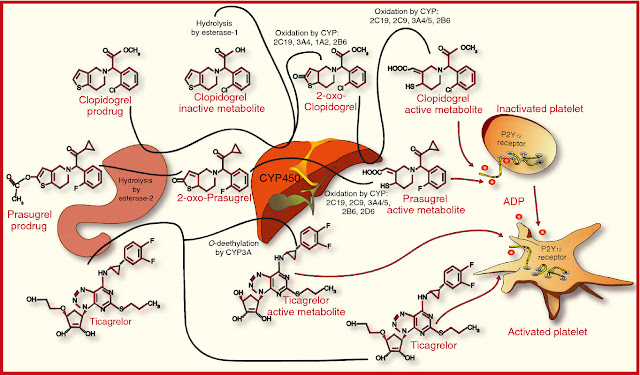U.S. P2Y12 Inhibitors Market Poised to Grow at a High CAGR Owing to Rising Cardiovascular Diseases Prevalence
 |
| U.S. P2Y12 Inhibitors Marke |
The U.S. P2Y12 inhibitors market comprises drugs that inhibit the binding of adenosine diphosphate (ADP) to its platelet P2Y12 receptor, preventing activation and aggregation of platelets. P2Y12 inhibitors are commonly used as antiplatelet agents after coronary stent placement or acute coronary syndromes to prevent thrombotic complications. These drugs play a vital role in managing cardiovascular diseases including myocardial infarction, unstable angina, and ischemic stroke. The increasing prevalence of cardiovascular diseases and growing number of cardiac procedures in the country are driving the demand for P2Y12 inhibitors in the United States.
The Global U.S. P2Y12 inhibitors Market is estimated to be valued at US$ 267.73 Mn in 2024 and is expected
to exhibit a CAGR of 6.5% over the
forecast period 2024 To 2031.
Key Takeaways
Key players operating in the U.S. P2Y12 inhibitors are Abcam plc, Bio-Rad
Laboratories, Inc., Cell Signaling Technology, Inc., BD Biosciences, Thermo
Fisher Scientific, Inc., Agilent Technologies, Inc., BioLegend, Inc., Merck
KGaA, Novus Biologicals, LLC, R&D Systems, Inc. (a Bio-Techne brand), Santa
Cruz Biotechnology, Inc., Beckman Coulter, Inc., Miltenyi Biotec GmbH, GeneTex,
Inc., MBL International Corporation. Major players are focusing on new product
launches and expansion of manufacturing facilities to strengthen their market
position.
The key opportunities in the market include increasing adoption of biosimilars
and novel oral antiplatelets. Biosimilar drugs provide cost-effective treatment
options compared to reference biologics, thereby positively impacting the
market growth.
Geographically, North America dominates the global U.S.
P2Y12 Inhibitors Market Size and
is expected to continue its dominance over the forecast period. However, Asia
Pacific is anticipated to exhibit the highest growth rate owing to the rising
healthcare expenditure and increasing focus of major players in developing
countries.
Market drivers
The major driver for the U.S. P2Y12 inhibitors market is the rapidly growing
geriatric population. As age increases the risks of developing heart diseases
also increases significantly. According to the United Nations, United States is
home to one of the largest population of older persons aged 65 years or over.
It is estimated that by 2050, 1 in 4 Americans will be aged 65 and over. This
growing pool of elderly individuals will augment the demand for cardiovascular
drugs including P2Y12 inhibitors in the country.
PEST
Analysis
Political: The regulations pertaining to the approval of new drugs and medical
devices are quite stringent in the US. Any changes in the regulatory environment
could impact the market either positively or negatively.
Economic: The US has one of the biggest healthcare markets globally. Changes in
the overall economy and healthcare spending can have a substantial impact on
the growth of the P2Y12 inhibitors market.
Social: With rising ageing population and chronic diseases prevalence, there is
growing awareness about heart diseases and treatment options available. This is
creating more demand for antiplatelet drugs like P2Y12 inhibitors.
Technological: Advancements in drug delivery mechanisms and development of
novel formulations for improving efficacy are expanding therapeutic
applications of P2Y12 inhibitors. Combination therapies with other
anticoagulants is also an area of active research.
The highest value concentration for the U.S. P2Y12 inhibitors market is in
regions with large population bases like California, Texas, Florida and New
York. These states contribute significantly to the national healthcare
expenditures. Western and Northeastern parts of the country account for over
60% share of the total market value.
The Midwestern region of the US, comprising states like Illinois, Ohio,
Michigan, Indiana, Wisconsin and Minnesota, is projected to witness the fastest
growth in the P2Y12 inhibitors market during the forecast period. This is
attributed to rising prevalence of cardiovascular ailments in the middle-aged
demographic and growing healthcare insurance coverage in this region.
Additionally, several pharmaceutical companies focusing on cardiovascular drugs
have production and R&D facilities located here, enhancing product
accessibility.



Comments
Post a Comment